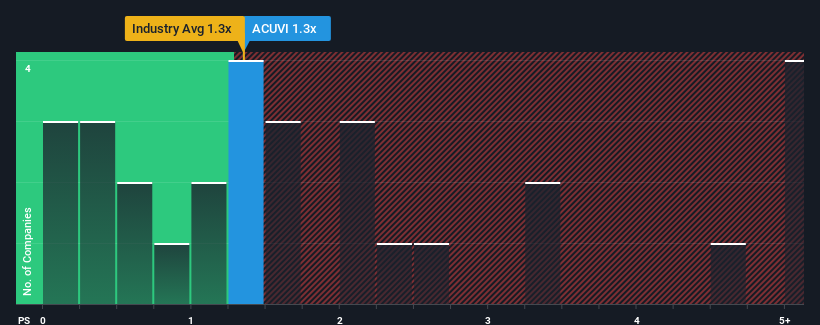- Sweden
- /
- Electrical
- /
- OM:ACUVI
Further Upside For Acuvi AB (STO:ACUVI) Shares Could Introduce Price Risks After 46% Bounce

Acuvi AB (STO:ACUVI) shareholders have had their patience rewarded with a 46% share price jump in the last month. Not all shareholders will be feeling jubilant, since the share price is still down a very disappointing 23% in the last twelve months.
Although its price has surged higher, there still wouldn't be many who think Acuvi's price-to-sales (or "P/S") ratio of 1.3x is worth a mention when it essentially matches the median P/S in Sweden's Electrical industry. Although, it's not wise to simply ignore the P/S without explanation as investors may be disregarding a distinct opportunity or a costly mistake.
View our latest analysis for Acuvi

How Acuvi Has Been Performing
Acuvi has been doing a good job lately as it's been growing revenue at a solid pace. One possibility is that the P/S is moderate because investors think this respectable revenue growth might not be enough to outperform the broader industry in the near future. Those who are bullish on Acuvi will be hoping that this isn't the case, so that they can pick up the stock at a lower valuation.
Although there are no analyst estimates available for Acuvi, take a look at this free data-rich visualisation to see how the company stacks up on earnings, revenue and cash flow.Is There Some Revenue Growth Forecasted For Acuvi?
There's an inherent assumption that a company should be matching the industry for P/S ratios like Acuvi's to be considered reasonable.
If we review the last year of revenue growth, the company posted a terrific increase of 15%. The latest three year period has also seen an incredible overall rise in revenue, aided by its incredible short-term performance. Accordingly, shareholders would have been over the moon with those medium-term rates of revenue growth.
Comparing that recent medium-term revenue trajectory with the industry's one-year growth forecast of 14% shows it's noticeably more attractive.
With this information, we find it interesting that Acuvi is trading at a fairly similar P/S compared to the industry. Apparently some shareholders believe the recent performance is at its limits and have been accepting lower selling prices.
The Bottom Line On Acuvi's P/S
Its shares have lifted substantially and now Acuvi's P/S is back within range of the industry median. Using the price-to-sales ratio alone to determine if you should sell your stock isn't sensible, however it can be a practical guide to the company's future prospects.
To our surprise, Acuvi revealed its three-year revenue trends aren't contributing to its P/S as much as we would have predicted, given they look better than current industry expectations. It'd be fair to assume that potential risks the company faces could be the contributing factor to the lower than expected P/S. It appears some are indeed anticipating revenue instability, because the persistence of these recent medium-term conditions would normally provide a boost to the share price.
There are also other vital risk factors to consider and we've discovered 3 warning signs for Acuvi (1 is a bit unpleasant!) that you should be aware of before investing here.
Of course, profitable companies with a history of great earnings growth are generally safer bets. So you may wish to see this free collection of other companies that have reasonable P/E ratios and have grown earnings strongly.
New: Manage All Your Stock Portfolios in One Place
We've created the ultimate portfolio companion for stock investors, and it's free.
• Connect an unlimited number of Portfolios and see your total in one currency
• Be alerted to new Warning Signs or Risks via email or mobile
• Track the Fair Value of your stocks
Have feedback on this article? Concerned about the content? Get in touch with us directly. Alternatively, email editorial-team (at) simplywallst.com.
This article by Simply Wall St is general in nature. We provide commentary based on historical data and analyst forecasts only using an unbiased methodology and our articles are not intended to be financial advice. It does not constitute a recommendation to buy or sell any stock, and does not take account of your objectives, or your financial situation. We aim to bring you long-term focused analysis driven by fundamental data. Note that our analysis may not factor in the latest price-sensitive company announcements or qualitative material. Simply Wall St has no position in any stocks mentioned.
About OM:ACUVI
Acuvi
Provides components and systems solutions for motion and positioning in Sweden and internationally.
Adequate balance sheet with acceptable track record.
Market Insights
Community Narratives



